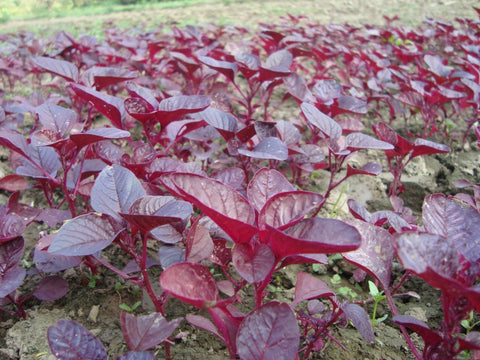Are Vegetables High In Nitrates Safe?
Yes, vegetables high in nitrates are very safe; in fact, they are a vital component for health and optimizing nitric oxide in the body. Nitric oxide boosters can help promote endurance, oxygen distribution, and overall circulation in the body. When consumed from vegetables, nitrate converts to nitrite when it interacts with the bacterial saliva in the back of the mouth. From here, nitrite is used to create nitric oxide in the stomach, blood vessels, and essential muscular tissues. Many people wonder what nitric oxide does, and the answer is that it has many roles. It works as a neurotransmitter, vasodilator, bronchodilator, and has many other benefits. But there are still some misconceptions that should be cleared up, primarily about the role and safety of nitrate.
Common Misconceptions About Nitrate
While there is a lot of misunderstanding about nitrate, the main facilitator of its benefits depends on the method of consumption. Professor Gunter Kuhnle, specializing in food and nutritional sciences at the University of Reading, U.K, explains the major differences between plant-derived nitrate and nitrates in meat, predominately cured meats. He states that once nitrite reaches the stomach, it converts into either nitric oxide or carcinogenic nitrosamines. The combination of nitrite and protein found in meat more often converts nitrite into nitrosamines, which are the unhealthy compounds that have previously given nitrates a bad reputation.
An important point to grasp here is that people tend to clump nitrates into one category that includes nitrate, nitrite, nitrosamines, sodium nitrate, and more. However, the specific molecule of nitrate itself isn’t harmful; it’s what it can turn into in the body that can either be extremely beneficial (nitric oxide) when consumed from vegetables or can be harmful (nitrosamines) when consumed from meat.
Plant matter is rich in antioxidants and minerals that prevent the formation of harmful nitrosamines. This is why it’s recommended to eat vegetables high in nitrates as a healthy modality to increase nitric oxide levels. These vegetables are completely safe and extremely beneficial for consumption on a daily basis.
Nitrate-Rich Plants vs. Nitrate Meat Preservatives
Nitrate in vegetables and nitrate in meat as a food preservative start off the same but have different outcomes in the body, as described above. Because it’s more expensive to source nitrate for food preservation, nitrite is often added to cured meats and bacon to avoid premature spoilage. Saliva contains nitrite, so it’s important to keep in mind this compound isn’t harmful on its own. When consuming ham, bacon, deli meats, or hotdogs, they lack the antioxidants, vitamins, and nutrients to convert that nitrate or nitrite into nitric oxide, which can have life-long impacts on health. Many scientific studies have revealed the vast benefits of eating plant-derived nitrate, making it increasingly important to implement these vegetables as a daily dietary habit.
The Benefits of Vegetables High In Nitrates

Nitrate is found in many vegetables, but there are some groups of vegetables that are packed with more nitrate than others. Studies, like the one from Edith Cowan University, show that just one cup of raw nitrate-rich vegetables or juice per day can improve vasodilation and cardiovascular health. Consuming nitrate foods with a goal to increase endurance and athletic performance might require a higher intake of nitrate; a standardized 400 mg nitrate concentration is recommended by some studies.
Vegetables high in nitrates are readily available, making them one of the easiest dietary supplements to source. Nitrate rich foods can be beneficial for middle-aged people who want to maintain healthy circulation. The human body manufactures nitric oxide endogenously (internally); however, production declines over time. To boost nitric oxide, it’s important to consider sourcing a variety of vegetables high in nitrates.
Here are some vegetables high in nitrates to incorporate into a daily diet for optimal nitric oxide health.
Beetroot & Beet Greens
Beets are loaded with nitrate. They are one of the most studied and popular vegetables high in nitrates. A study conducted among 38 adults revealed that the level of nitric oxide increased by 21% just after 45 minutes of drinking beetroot juice. Another survey concluded that only 100 ml of beetroot juice is significant enough to increase the levels of nitric oxide in both sexes. Beets are known for health benefits like boosting physical performance, supporting healthy circulation, and enhancing the body’s metabolic processes.
Red Spinach
Leafy vegetables, especially green spinach, are loaded with nitrate and essential antioxidants. Red spinach (technically not actual spinach) in particular, is known for its remarkable benefits of increasing nitrate levels in saliva by seven times. This drastic increase is ideal for improving sports performance but is also valuable for supporting healthy circulation and maintaining overall health as we age.
Arugula
Coming in under red spinach, the peppery green arugula contains some of the highest amounts of nitrate. Leafy greens are a great option for sourcing nitrate, but arugula packs an extra nitrate punch along with delivering high fiber, antioxidants, and bone strengthening nutrients.
Bok Choy
Bok Choy contains a high amount of nitrate and a dense nutrient profile. This includes calcium, magnesium, iron, phosphorus, zinc, and vitamin K, which are beneficial for bone health.
Broccoli
One of the most popular and easy to source vegetables is broccoli. It is nitrate rich and contains powerful antioxidants like sulforaphane, and its versatility lends itself to being prepared in many different ways.
Celery
Rich in antioxidants, celery has been shown to fight free radicals, increase nitric oxide, and support circulation. It’s also known for promoting digestive health and has hydration properties that make it great for everyday consumption.
Swiss Chard
Swiss Chard is another great example of a vegetable high in nitrate and is also rich in vitamin A, K, H, and beta-carotene.
Green Spinach
Green spinach, as mentioned above for its nitrate content, can also boost muscular function and overall health. It is recommended to eat green spinach raw to preserve the antioxidants and other nutrients that help support nitric oxide production.
Kale
Kale is widely known for its health benefits, like high levels of magnesium and potassium. It’s also a great example of vegetables high in nitrates. Chewing kale can offer benefits to the oral microbiome versus juicing. When you chew kale, it activates the bacteria in the crevices of the mouth that convert nitrate to nitrite.
Mustard Greens
Mustard greens contain the essential antioxidants and vitamins needed to support cardiovascular and cardiorespiratory health. This includes beta carotene, vitamins A, C, K, and nitrate.
Rhubarb
Rhubard is a beautiful dietary addition, predominately known for its colorful, free-radical fighting benefits. One serving of rhubarb is enough to substantially supplement nitrate and increase nitric oxide levels.
Spirulina
Spirulina has gained popularity through the years and is often used as a vegan protein powder supplement. It’s rich in essential peptides and nitrate that increase nitric oxide and supports oxygen and nutrient flow.
Vegetables High in Nitrates Support a Nitric Oxide Lifestyle

Overall, there are many benefits to eating naturally-derived vegetables high in nitrates, and yes, they are a completely safe method to boost nitric oxide levels. It’s recommended to increase whole foods in any diet to improve vitamin and mineral intake. Adding nitrate rich vegetables to those whole foods is great for boosting nitric oxide, increasing cardiovascular health, and improving oxygen and nutrient flow for the entire body. At all stages of life, there are benefits to eating plants rich in nitrate; it’s an ideal way to safely gain optimal health for years to come.
References:
Machha, A., & Schechter, A. N. (2012). Inorganic nitrate: A major player in the cardiovascular health benefits of vegetables? Nutrition Reviews, 70(6), 367–372. https://doi.org/10.1111/j.1753-4887.2012.00477.x
Liu, A. H., Bondonno, C. P., Croft, K. D., Puddey, I. B., Woodman, R. J., Rich, L., Ward, N. C., Vita, J. A., & Hodgson, J. M. (2013). Effects of a nitrate-rich meal on arterial stiffness and blood pressure in healthy volunteers. Nitric Oxide, 35, 123–130. https://doi.org/10.1016/j.niox.2013.10.001
Kroll, J. L., Werchan, C. A., Rosenfield, D., & Ritz, T. (2018). Acute ingestion of beetroot juice increases exhaled nitric oxide in healthy individuals. PloS One, 13(1), e0191030–e0191030. https://doi.org/10.1371/journal.pone.0191030
Baião, D. dos S., Conte-Junior, C. A., Paschoalin, V. M. F., & Alvares, T. S. (2016). Beetroot juice increases nitric oxide metabolites in both men and women regardless of body mass. International Journal of Food Sciences and Nutrition, 67(1), 40–46. https://doi.org/10.3109/09637486.2015.1121469
Morihara, N., Sumioka, I., Moriguchi, T., Uda, N., & Kyo, E. (2002). Aged garlic extract enhances production of nitric oxide. Life Sciences, 71(5), 509–517. https://doi.org/10.1016/S0024-3205(02)01706-X
Ignarro, L. J., Byrns, R. E., Sumi, D., de Nigris, F., & Napoli, C. (2006). Pomegranate juice protects nitric oxide against oxidative destruction and enhances the biological actions of nitric oxide. Nitric Oxide, 15(2), 93–102. https://doi.org/10.1016/j.niox.2006.03.001
de Nigris, F., Balestrieri, M. L., Williams-Ignarro, S., D’Armiento, F. P., Fiorito, C., Ignarro, L. J., & Napoli, C. (2007). The influence of pomegranate fruit extract in comparison to regular pomegranate juice and seed oil on nitric oxide and arterial function in obese Zucker rats. Nitric Oxide, 17(1), 50–54. https://doi.org/10.1016/j.niox.2007.04.005
Kim, I.-Y., Schutzler, S. E., Schrader, A., Spencer, H. J., Azhar, G., Deutz, N. E. P., & Wolfe, R. R. (2015). Acute ingestion of citrulline stimulates nitric oxide synthesis but does not increase blood flow in healthy young and older adults with heart failure. American Journal of Physiology. Endocrinology and Metabolism, 309(11), E915–E924. https://doi.org/10.1152/ajpendo.00339.2015
Mortensen, A., & Lykkesfeldt, J. (2014). Does vitamin C enhance nitric oxide bioavailability in a tetrahydrobiopterin-dependent manner? In vitro, in vivo and clinical studies. Nitric Oxide, 36, 51–57. https://doi.org/10.1016/j.niox.2013.12.001
Kalaycıoğlu Z, Erim FB. Nitrate and Nitrites in Foods: Worldwide Regional Distribution in View of Their Risks and Benefits. J Agric Food Chem. 2019 Jul 3;67(26):7205-7222. doi: 10.1021/acs.jafc.9b01194. Epub 2019 Jun 24. PMID: 31244197.
Lee, S. Y., Munerol, B., Pollard, S., Youdim, K. A., Pannala, A. S., Kuhnle, G. G., Debnam, E. S., Rice-Evans, C., & Spencer, J. P. (2006). The reaction of flavanols with nitrous acid protects against N-nitrosamine formation and leads to the formation of nitroso derivatives which inhibit cancer cell growth. Free radical biology & medicine, 40(2), 323–334. https://doi.org/10.1016/j.freeradbiomed.2005.08.031
Macuh, M., & Knap, B. (2021). Effects of Nitrate Supplementation on Exercise Performance in Humans: A Narrative Review. Nutrients, 13(9), 3183. https://doi.org/10.3390/nu13093183





Comments (0)
There are no comments for this article. Be the first one to leave a message!